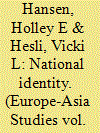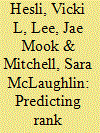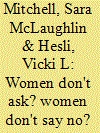|
|
|
Sort Order |
|
|
|
Items / Page
|
|
|
|
|
|
|
| Srl | Item |
| 1 |
ID:
105444


|
|
|
|
|
| Publication |
2011.
|
| Summary/Abstract |
The justification for studying faculty research productivity is that it affects individual advancement and reputation within academe, as well as departmental and institutional prestige (Creamer 1998, iii). Publication records are an important factor in faculty performance evaluations, research grant awards, and promotion and salary decisions. The phrase "publish or perish" encapsulates the importance of research productivity to academic careers. In addition, questions are sometimes raised about whether an individual's status as a minority within academia (e.g., being a member of an underrepresented ethnic or racial group or being female in a male-dominated profession) affects his or her ability to publish or likelihood of publishing (Cole and Zuckerman 1984; Bellas and Toutkoushian 1999). Finally, most previous work that tackles the productivity causality puzzle comes from disciplines other than political science. Thus, one of the purposes of this report is to explore whether the existing findings about research productivity in other disciplines apply equally well to research productivity in political science.
|
|
|
|
|
|
|
|
|
|
|
|
|
|
|
|
| 2 |
ID:
121630


|
|
|
|
|
| Publication |
2013.
|
| Summary/Abstract |
In studying the correlates of job satisfaction among political science faculty we confirm some findings from other disciplines, such as the relationship between institutional type and satisfaction. We demonstrate that those working in top-ranked departments or in private institutions tend to have higher levels of satisfaction with their jobs and with their contributions to the profession. Both job satisfaction and professional satisfaction tend to be highest among full professors; and greater productivity in terms of publishing is independently linked to greater levels of professional satisfaction. In contrast, comparatively higher undergraduate teaching loads undermine professional satisfaction. We also determine that men and women do not differ systematically from one another in their satisfaction levels. We do, however, document significantly lower levels of satisfaction among racial minorities in political science departments. In exploring this finding, we uncover reports of discrimination and dramatic differences in levels of collegiality experienced by different subgroups of faculty members. Experiences with discrimination undermine job satisfaction and are more frequently reported by women than men and are more common among minority faculty than nonminorities.
|
|
|
|
|
|
|
|
|
|
|
|
|
|
|
|
| 3 |
ID:
086232


|
|
|
|
|
| Publication |
2009.
|
| Summary/Abstract |
We challenge the civic-ethnic dichotomy drawn by previous authors and propose a four-category typology of identities based on out-group tolerance and in-group attachment. Drawing from work on national identity formation and nation-building, we test hypotheses about the processes that cause individuals to adopt one identity over others using survey data based on representative samples of five ethnic groups in Ukraine. We find that the effects of socialisation processes vary greatly depending upon ethnic group. Our results challenge some long-held assumptions about the potential destabilising effects of 'ethnic' identities and the degree to which 'civic' identities correspond to values and behaviours supportive of democracy.
|
|
|
|
|
|
|
|
|
|
|
|
|
|
|
|
| 4 |
ID:
117584


|
|
|
|
|
| Publication |
2012.
|
| Summary/Abstract |
We report the results of hypotheses tests about the effects of several measures of research, teaching, and service on the likelihood of achieving the ranks of associate and full professor. In conducting these tests, we control for institutional and individual background characteristics. We focus our tests on the link between productivity and academic rank and explore whether this relationship reveals a gender dimension. The analyses are based on an APSA-sponsored survey of all faculty members in departments of political science (government, public affairs, and international relations) in the United States.
|
|
|
|
|
|
|
|
|
|
|
|
|
|
|
|
| 5 |
ID:
121631


|
|
|
|
|
| Publication |
2013.
|
| Summary/Abstract |
This article examines the dual problems of "women don't ask" and "women don't say no" in the academic profession. First, we consider whether female faculty bargain more or less frequently than male faculty about such resources as salary, research support, clerical support, moving expenses, and spousal accommodation. Analyzing a 2009 APSA survey, we find that women are more likely to ask for resources than men when considering most categories of bargaining issues. This finding goes against conventional wisdom in the literature on gender and bargaining that suggests that women are less likely to bargain than men. Second, we seek to understand if women are reluctant to say no when asked to provide service at the department, college, university, or disciplinary levels. We find that women are asked to provide more service and that they agree to serve more frequently than men. We also find that the service women provide is more typically "token" service, as women are less likely to be asked by their colleagues to serve as department chair, to chair committees, or to lead academic programs. The implications of these results for the leaky pipeline in the academic profession are discussed.
|
|
|
|
|
|
|
|
|
|
|
|
|
|
|
|
|
|
|
|
|